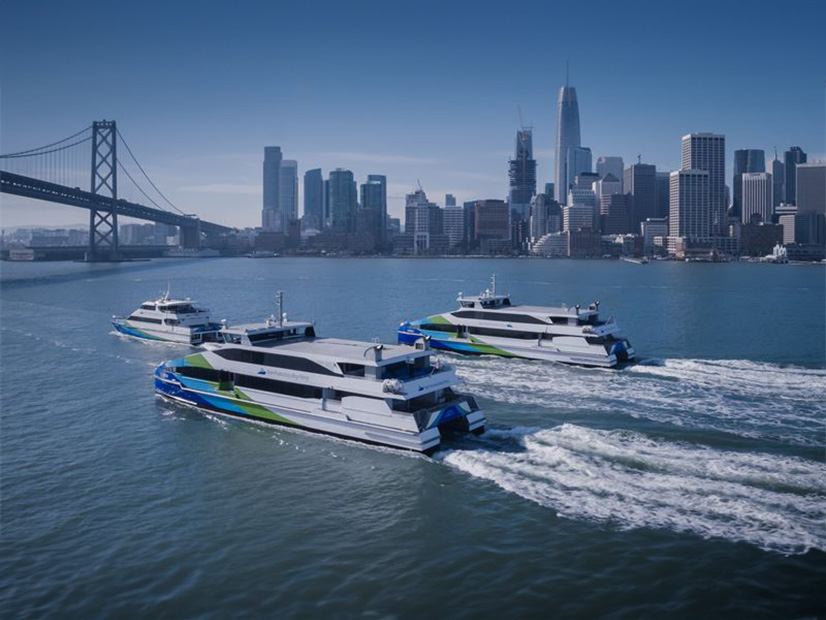
The California Energy Commission award was among $87M provided for medium- and heavy-duty ZEV chargers.
Plans to transition California’s largest public ferry fleet to zero-emission vessels got a boost from a $5 million grant for charging infrastructure from the California Energy Commission.
The CEC awarded the funds Aug. 14 to the Water Emergency Transportation Authority (WETA), the agency that runs San Francisco Bay Ferry service. The funds will be used to install a “charging float” consisting of a dock, charger and battery storage.
The money was part of $87 million in grant funding the CEC voted to approve during the meeting. Much of the funding went to infrastructure projects for medium- and heavy-duty zero emission vehicles.
State’s Largest Public Fleet
With 15 vessels carrying about 3 million passengers a year across several routes, San Francisco Bay Ferry is California’s largest public ferry fleet.
The fleet runs on diesel, but WETA is planning a transition to zero-emission vessels through its Rapid Electric Emission-Free (REEF) program. The agency has set a goal of shifting half its fleet to zero emission by 2035.
Last month, the ferry service launched the MV Sea Change, a 75-passenger vessel described as the world’s first commercial passenger ferry powered completely by zero-emission hydrogen fuel cells. The California Air Resources Board funded the vessel’s development.
Owned by SWITCH Maritime, the hydrogen-powered ferry will run for a six-month demonstration period. Sponsors of the demonstration service include Chevron New Energies, United Airlines and the Golden Gate Bridge, Highway and Transportation District.
In November, the Federal Transit Administration awarded a $16 million grant to WETA for the electrification of four ferry floats. The project involves structural alterations to the passenger floats, installation of battery banks and vessel charging equipment, and grid connections.
WETA now plans to buy an electric ferry with funding from the Bay Area Toll Authority and the regional Metropolitan Transportation Commission.
Elsewhere on the West Coast, Washington State Ferries announced last month that it is partnering with ABB, a marine technology company, on the design and construction of five new hybrid-electric, 160-auto-capacity ferries. WSF, the largest ferry system in the U.S., has set a goal of running a zero-emission fleet by 2050.
Under mandates from the state legislature and governor, WSF will transition to hybrid-electric power by 2040.
Implementing Blueprints
WETA previously received CEC funding to develop a plan called a blueprint for transitioning to a zero-emission ferry fleet. The agency was one of 34 entities that completed blueprints for infrastructure to support medium- and heavy-duty zero-emission vehicles.
“To be able to move swiftly to deploy infrastructure for zero-emission vehicles, you actually have to have a plan,” Commissioner Patty Monahan said before voting for the WETA funding. “And you have to think about where you want to site it, how it fits with the grid.”
In addition to WETA’s ferry-charging project, the CEC voted Aug. 14 to approve funding for two other projects that came from the blueprints.
The city of Long Beach received $5 million for DC fast chargers and a battery backup system for the city’s medium- and heavy-duty truck fleet. Another $5 million went to Pilot Travel Centers for two rapid hydrogen dispensers and a hydrogen storage tank at a truck stop off Interstate 5 in Southern California.
The CEC awarded grant funding to an array of other projects on Aug. 14. Those include:
-
- International Transportation Service received $3 million for hands-free EV charging stations at the Port of Long Beach, including a dynamic charging rail that can charge up to five yard tractors while they’re in operation.
- Penske Truck Leasing received $7.9 million for chargers at two locations for its growing medium- and heavy-duty EV rental fleet.
- Skycharger LLC received $10 million for EV chargers at the Port of San Diego for overnight and opportunity truck charging, as well as a 1.7 MW solar-powered microgrid and 1 MW battery storage system.



